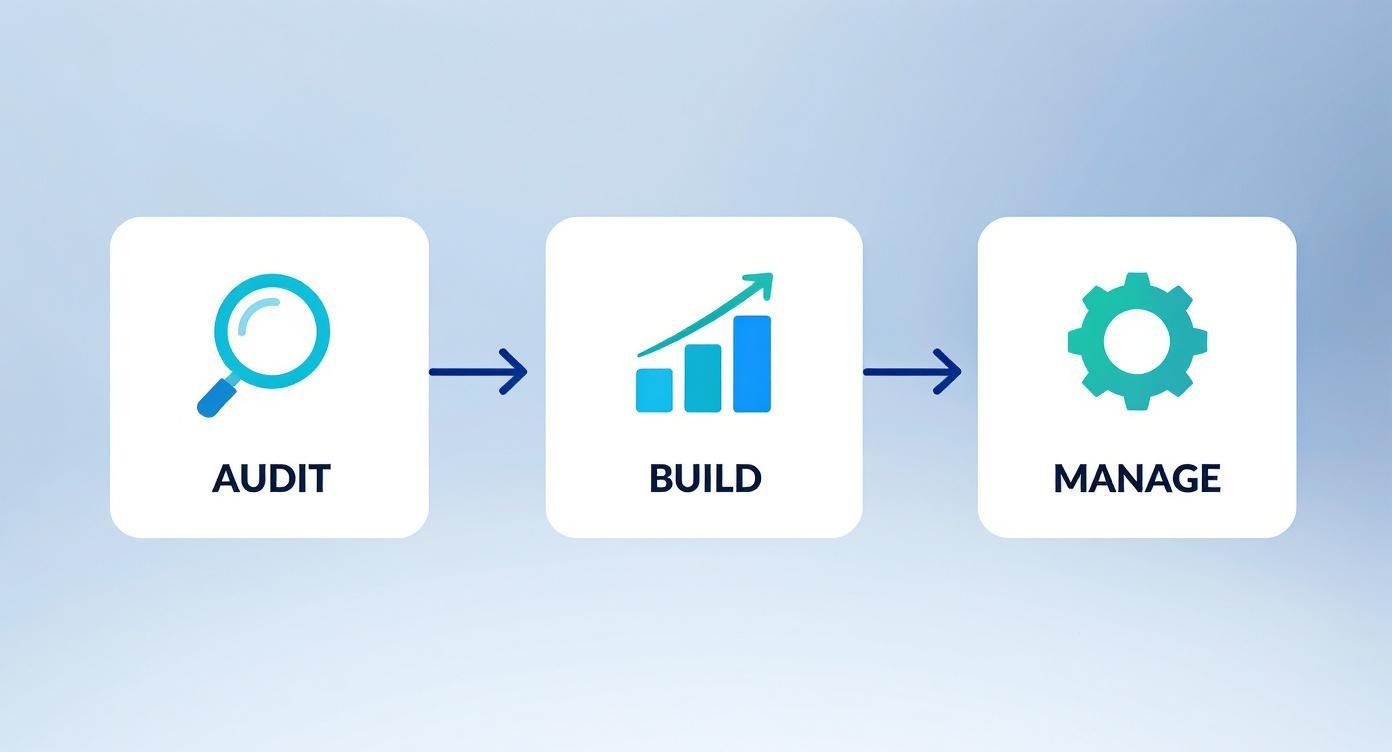
what is a local citation? Quick guide to local SEO
Share
So, what exactly is a local citation? Think of it as your company's digital business card. It's any mention of your restaurant equipment business's Name, Address, and Phone Number (NAP) anywhere online.
These digital breadcrumbs are scattered across the web on directories, social media sites, and industry blogs. For search engines like Google, each citation acts as a verification stamp, confirming that your business is legitimate, located where you say it is, and ready to serve customers. They're a cornerstone of ranking well in local search results.
Your Digital Business Card: Why Consistency is King

Put yourself in your customer's shoes for a minute. Let's say a local pizzeria is desperately searching for a new commercial oven. If they find your business listed with three different addresses online, are they going to trust you? Probably not.
Google thinks the same way. A local citation is essentially a "vote of confidence" from another website. Each time a reputable platform like Yelp, a local chamber of commerce site, or even a Facebook page lists your correct NAP, it tells Google, "Yep, this business is real and their information is solid."
This is where consistency becomes critical. Mismatched information creates red flags for both search engines and potential buyers, which can kill your chances of showing up in those valuable "near me" searches. The more consistent and widespread your citations are, the more trustworthy and authoritative your business looks in Google's eyes.
The Core Components of a Local Citation
While the NAP (Name, Address, Phone) is the heart of a citation, a truly effective one includes a bit more information. Each additional piece helps search engines paint a clearer picture of your business, which ultimately helps you rank higher.
The table below breaks down the essential data points that make up a powerful citation.
Core Components of a Local Citation
| Component | Description | Why It's Critical |
|---|---|---|
| Name | Your official, legally registered business name. | This has to be identical everywhere. Even small variations can create confusing duplicate listings and dilute your authority. |
| Address | Your physical, street-level business address. | This verifies your location for map results and confirms the areas you serve, which is crucial for local customers. |
| Phone | Your primary business phone number, preferably with a local area code. | It provides a direct line for customers and reinforces your connection to the local community. |
| Website | A direct link to your business’s homepage (often called NAPW). | This is how you drive traffic from the citation back to your site and connect all the dots for Google. |
Getting these four elements right is non-negotiable for building a strong local presence. They work together to signal your legitimacy and relevance to both search engines and customers.
For any restaurant equipment business, the most important citation to get right is your Google Business Profile. This is often the very first impression a potential customer will have of your brand. If you haven't set this up yet, it's your top priority.
For step-by-step instructions, check out our guide on adding your business to Google.
Why Citations Are a Cornerstone of Local SEO
Think of Google as a detective trying to figure out if your restaurant equipment business is legit. Every time it stumbles across your business's Name, Address, and Phone number (NAP) on a reputable website, it's like finding another solid piece of evidence. The more consistent clues it finds, the more confident it gets that your business is real, active, and trustworthy.
This trust is pure gold in the world of local search. When Google trusts your business information, it’s much more likely to show you to potential customers. This has a direct impact on your rankings, especially in that all-important Google "Local Pack"—the map with three business listings that pops up for searches like "commercial refrigerators near me."
A strong, consistent citation profile is a foundational pillar of https://restaurantequipmentseo.com/blogs/restaurant-equipment-seo-blog/what-is-local-seo. It sends a clear signal to search engines that you're a major player in your local area.
Turning Digital Mentions into Real-World Customers
Citations don't just work their magic on search engine algorithms; they also build a bridge of trust with potential buyers before they even click over to your website. When a restaurant owner sees your correct business details on multiple trusted platforms, it’s reassuring. In the high-stakes world of B2B restaurant equipment sales, that digital confidence is everything.
The numbers don't lie. Recent studies show that businesses with complete and consistent citations across the most important directories can see up to a 25% boost in local search visibility. Considering that around 46% of all Google searches are for local information, being visible in that exact moment is how you capture new leads.
This isn't just a technical SEO box to check off; it's a core business strategy. Each accurate citation solidifies your digital footprint, making it a no-brainer for search engines to connect your business with a local chef actively looking for the equipment you sell.
The Connection Between Citations, Reviews, and Rankings
Your citation strategy is closely tied to other critical local ranking factors, especially online reviews. The very same platforms that list your business information, like your Google Business Profile or Yelp page, are also the main places where customers share their experiences. A solid citation profile makes it easy for customers to find where to leave those all-important reviews.
This creates a powerful, self-reinforcing cycle:
- Visibility: More citations mean more people find your business.
- Credibility: Consistent info builds trust and encourages customers to engage.
- Reviews: Engaged customers are more likely to leave reviews, which are a massive ranking signal.
To really make this work for you, it's vital to understand how Google Reviews help SEO and weave that knowledge into your local marketing plan. Citations lay the verified groundwork, and a stellar online reputation is built right on top of it, driving both your search rankings and your sales.
Structured vs Unstructured Citations

When your restaurant equipment business gets mentioned online, it's not all the same in Google's eyes. These digital breadcrumbs, or citations, come in two flavors: structured and unstructured. Getting a handle on the difference is crucial for building a strong, trustworthy online presence that search engines will happily recommend to potential customers.
Think of structured citations like the neat, organized entries in a phone book or a digital rolodex. They appear on business directories where your information is plugged into specific, pre-set fields: Business Name, Address, Phone Number (NAP), website, etc. They are clean, predictable, and incredibly easy for search engines to read and confirm.
Unstructured citations, on the other hand, are the casual, conversational mentions you might see online. Picture a local food blogger writing about a new cafe and mentioning they sourced their espresso machine from your shop. It’s less formal, but these organic mentions are powerful trust signals that show you're a real part of the local community.
Structured Citations: The Foundation of Trust
Structured citations are the bedrock of your local SEO strategy. They hand-feed search engines the exact, consistent data they need to verify your business's existence and location. This consistency is a massive trust signal for Google. It's the digital equivalent of having all your official paperwork in perfect order.
You'll find these tidy listings on all sorts of formal business directories and industry sites. Some of the most common places include:
- Major Data Aggregators like Google Business Profile, Yelp, and Bing Places.
- Industry-Specific Hubs such as restaurant association websites or directories dedicated to food service equipment suppliers.
- Local Community Platforms, like your town's Chamber of Commerce site or a local business journal.
Because these platforms present your information in a standardized format, they make it incredibly simple for search engines to index your business accurately. For a deeper dive, you can find more great information on how search engines process this data on searchengineland.com.
Unstructured Citations: The Power of Buzz
If structured citations are your official business license, unstructured citations are the word-of-mouth buzz around town. They are the organic mentions that pop up in the flow of online content.
Think of it this way: a mention of your business in a local newspaper article about a restaurant opening, or a shout-out on a community Facebook page, is an unstructured citation. These are gold because they act as natural, third-party endorsements.
They tell Google that your business isn't just a name in a directory; it's an active, recognized, and relevant part of the local economy.
To give you a clearer picture, here’s a quick breakdown of how the two types stack up.
Structured vs Unstructured Citations At a Glance
This table helps you quickly see the key differences between these two important citation types.
| Attribute | Structured Citations | Unstructured Citations |
|---|---|---|
| Format | Standardized, in predefined fields (Name, Address, Phone). | Free-form, embedded within natural text. |
| Location | Business directories, data aggregators (e.g., Yelp, Google Business Profile). | Blog posts, news articles, forums, social media posts. |
| Primary SEO Value | Builds foundational trust and authority with search engines. | Provides social proof, topical relevance, and local authority. |
| Example | Your complete business listing on a local Chamber of Commerce website. | A food blogger mentioning they bought their oven from your store. |
| Analogy | A perfectly organized filing cabinet. | A casual conversation or a recommendation from a friend. |
Ultimately, a winning local SEO strategy doesn't choose one over the other—it uses both. Structured citations lay the consistent, verifiable groundwork that search engines crave, while unstructured citations add the layer of real-world credibility and social proof. Together, they create a balanced and powerful portfolio that significantly boosts your visibility in local search results.
How to Build and Manage Your Citations
Building a strong citation profile isn't a numbers game where you just blast your business info across hundreds of random websites. It’s a deliberate process that rewards quality and consistency. Think of it like building a house—you’d never put up the walls without first pouring a solid, level foundation. That foundation, in this case, is a deep audit of your existing online presence.
You've got to put on your digital detective hat and hunt down every single mention of your business online. Pay close attention to inconsistencies in your Name, Address, and Phone number (NAP). Does one directory list you on "St." while another spells out "Street"? Is an old, disconnected phone number still lurking on a forgotten profile? These tiny differences are enough to confuse search engines and hurt your local rankings.
Starting with a Citation Audit
The whole point of an audit is to get a clean slate. Your mission is to find and fix any inaccurate information and get rid of any duplicate listings that could be splitting your SEO authority. This cleanup phase is absolutely non-negotiable if you want to build a digital footprint that search engines and customers can trust.
When you start your audit, focus on the big players first. Your priority list should look something like this:
- Core Search Engines: Google Business Profile, Bing Places, and Apple Maps are the big three. Get these perfect before you do anything else.
- Primary Data Aggregators: Services like Foursquare and Data Axle are massive data providers that feed information to hundreds of other online directories.
- Tier 1 Directories: These are the household names and high-authority sites like Yelp, Facebook, and the Better Business Bureau (BBB).
After you’ve tidied up these foundational sites, you can start working your way down to smaller, industry-specific directories. Remember, one perfectly accurate listing on a key platform is worth more than a dozen inconsistent ones scattered across the web.
This initial cleanup ensures that any new citations you build are based on a consistent, accurate source of truth. Neglecting this step is like building on a shaky foundation—it’s bound to cause problems down the line.
Strategies for Building New Citations
Once your existing online presence is squeaky clean, it's time to start building new, high-quality citations. There are really three ways to go about this, and most businesses find that a mix of all three delivers the best results.
-
Manual Submissions: This is the hands-on approach. You go to each directory website one-by-one and fill out your business profile yourself. It’s definitely time-consuming, but it gives you total control, allowing you to add rich details like photos, specific business hours, and detailed descriptions of your equipment and services.
-
Using Data Aggregators: This is the efficiency play. You submit your business information to a handful of major data aggregators, and they push that data out across their massive networks. It’s a great way to get listed on hundreds of sites at once, including some that don’t even have a way for you to submit manually.
-
Hiring a Professional Service: Let's face it, most business owners are short on time. Professional citation-building services can take this entire process off your plate. They'll handle the audit, the cleanup, and all the new submissions, making sure your profile is built correctly from the ground up.
To efficiently handle your local business information, considering various business management tools can be a strategic move. For a more detailed walkthrough and expert strategies, check out our comprehensive guide on how to build local citations for your business.
Finding the Best Citation Sources for Your Niche
Getting generic advice to "just build more citations" is pretty common, but it's a bit like being told to "just advertise more." It's not very helpful, is it? To actually get ahead of the competition, you have to be strategic about where you build those citations.
Think of it this way: you wouldn't take out a billboard on a quiet country road to sell a six-burner commercial range. You’d place an ad in a trade magazine that lands in front of thousands of chefs and restaurateurs. The same logic applies to where your business information shows up online.
For a restaurant equipment supplier, getting your name on a niche B2B portal is infinitely more valuable than a listing on some random, low-traffic directory. Search engines like Google are smart; they understand context. When Google spots your business on websites all about the food service industry, it gets a powerful signal that you're a legitimate, authoritative player in that field. That kind of relevance is exactly what helps boost your local search rankings.
Identifying High-Impact Niche Directories
Of course, the big players like Google Business Profile and Yelp are table stakes—you absolutely have to be there. But the real secret sauce for getting an edge is to dig deeper and find the online hangouts where your ideal customers are already spending their time.
For a restaurant equipment business, these high-value spots often include:
- Hospitality Industry Associations: Think of sites like the National Restaurant Association or your local state-level chapters. A listing in their member directory is a huge vote of confidence.
- Food Service Trade Publications: The online versions of magazines like Foodservice Equipment & Supplies or Restaurant Business are goldmines for mentions in articles or supplier lists.
- B2B Equipment Portals: Websites built specifically for buying and selling commercial equipment are prime real estate for a well-structured citation.
- Local Chamber of Commerce Sites: This is a fantastic way to signal to Google that you’re a real, established part of the local business community.
This whole process can be boiled down to a simple, continuous loop. You have to find what's out there, build what's missing, and keep an eye on everything.

As you can see, this isn't a "set it and forget it" task. It's an ongoing strategy of auditing your existing listings, building new ones, and managing them over time to ensure everything stays accurate.
A Framework for Your Own Industry
This line of thinking isn't just for the restaurant world. You can apply the same logic to find the best citation sources for any niche business, from a local plumber to a specialized software company. Just start by asking yourself: where do my customers spend their time online?
The goal is to create a citation profile that tells a clear and consistent story. A mention on an authoritative industry website acts as a powerful endorsement, signaling to both search engines and potential customers that you are a trusted expert in your field.
By placing your digital business card in these highly relevant online locations, you're not just getting a backlink—you're turning a simple mention into a real business opportunity. Prioritizing these niche-specific sources over just piling up a high quantity of random listings is how you build a citation profile that actually moves the needle.
Common Citation Mistakes That Hurt Your Rankings

When it comes to local SEO, the devil is truly in the details. Building up your local citations can be a game-changer, but only if you get it right. It’s surprisingly easy to make small mistakes that quietly torpedo your efforts, leaving search engines confused and your rankings stuck in neutral.
Let's dive into the most common—and damaging—blunders I see all the time.
The Problem of Inconsistent Information
The number one mistake is NAP inconsistency. This is when your business Name, Address, and Phone number don't match up perfectly across the web.
For a restaurant equipment business, this could be as simple as listing your address as "123 Main St." on your Yelp profile but "123 Main Street" on your website. To a human, it's the same place. But to Google's algorithm, those are two different signals, potentially for two different businesses.
These tiny discrepancies sow seeds of doubt, diluting your authority and making it harder for search engines to trust that your information is correct.
Duplicate Listings and Junk Directories
Another major pitfall is having duplicate listings floating around online. This usually happens accidentally when a business moves, gets a new phone number, or even rebrands. You end up with old, abandoned profiles that compete with your current, accurate one, effectively splitting your SEO authority.
Then there's the temptation to chase quantity over quality. Building hundreds of citations on spammy, irrelevant directories might feel productive, but it’s a total waste of time. Worse, it can even hurt your reputation. Search engines are smart enough to know which directories are junk, so listings on them carry zero weight.
The bottom line is this: A small handful of perfectly accurate citations on high-quality, relevant websites is infinitely more powerful than hundreds of messy, inconsistent listings scattered across the internet.
Think of it as building a clean, trustworthy digital footprint. By sidestepping these common mistakes, you ensure your citation work becomes a powerful asset that helps you climb the local search rankings, not a hidden liability holding you back.
Got Questions About Local Citations? We've Got Answers.
When you first dive into local citations, a few key questions always pop up. How long does this stuff actually take? What should I be focusing on? Should I even be doing this myself? Getting a handle on these practical points is crucial for making sure your effort and money are well-spent. Let's clear up some of the most common questions we hear from restaurant equipment business owners.
How Long Does It Take to See Results From Citations?
This is the big one, and the honest answer is: it takes a bit of patience. While getting your Google Business Profile locked in can give you a quick win, the full impact of a broad citation campaign doesn't happen overnight. You're typically looking at anywhere from a few weeks to several months for search engines to find, process, and start trusting all your new listings across the web.
Think of it like building a reputation in your community. A single good word helps, but real trust is built over time, through consistent positive mentions. The same goes for Google. The fastest boost often comes from cleaning up the mess of old, incorrect information first.
The key thing to remember is that consistency over time is what really moves the needle. A steady stream of accurate listings built over months sends a much stronger signal to Google than just blasting out hundreds of them all at once.
Is It Better to Have More Citations or Higher-Quality Ones?
This isn't even a debate in the SEO world: quality and consistency will always beat sheer quantity. It's far more powerful to have your business listed perfectly on 50 important, industry-specific directories than it is to be on 500 random, low-quality sites with a few typos here and there.
Why? Because search engines run on trust. A handful of perfect, authoritative listings build that trust effectively. On the other hand, a ton of inconsistent listings on spammy-looking sites just confuses Google, waters down your authority, and can actually hurt your rankings. Nail your core listings first.
Should I Build Citations Myself or Hire Someone?
Deciding whether to go DIY or hire a pro really boils down to your time and expertise.
Building citations by hand gives you total control, which is great. But be warned, it's a massive time sink. You have to hunt down all your existing listings, fix all the errors, and then manually submit your info to every single directory, one by one. It's tedious work.
For most busy owners, hiring a specialized service is a much smarter move. Experts have the software and the systems to audit, clean up, and build high-quality citations far more efficiently. Outsourcing this frees you up to do what you do best: run your business. The return on investment is almost always worth it.
Ready to build a powerful citation profile without all the manual labor? Restaurant Equipment SEO specializes in creating accurate, high-authority citations that put your business on the map. Visit us at https://restaurantequipmentseo.com to see how our expert services can get your local rankings climbing.